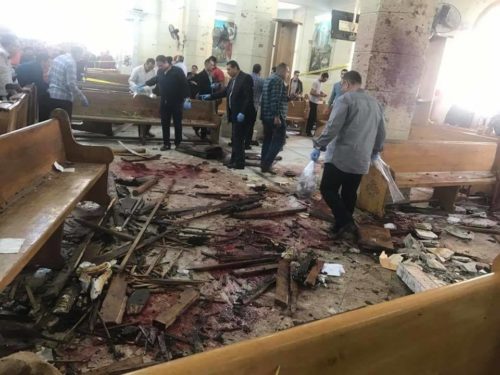As Egypt’s Coptic Church lays to rest the victims of the Palm Sunday bomb attacks on two churches, voices from the Muslim community in the country have condemned the attacks and Muslim citizens have lined up to donate blood for the injured.
Writing a blog for the website Patheos, Khwaia Khusro Tariq remembers how as a child he would spend Thursday evenings at the Coptic Club in Khartoum, Sudan, where, Copt-or-not, “everyone was welcome”.
Following Sunday’s attacks, he quotes the Qur’an when he writes that fighting minority persecution is both a humanistic and religious duty for all Muslims.
In a statement, the Grand Imam of Cairo’s Al-Azhar Mosque, Ahmed el-Tayeb, said that “attacks against places of worship go against the authentic Islamic religion and its teachings of tolerance, but fail to undermine the unity of the Egyptian people”.

Following the attacks, Muslim citizens rushed to mosques to donate blood for those who were injured. Mohammed Ahmad Hassan, a resident of Tanta, where one bomb exploded, was quoted as saying that loudspeakers were used to call on people in the city to head to mosques and donate blood to help those injured by the attack. The call came as blood stocks at the hospitals were beginning to run out.
Both attacks were claimed by the Islamic State group, which in February threatened to wipe out Egypt’s Copts. They warned of more attacks in a statement, saying: “The Crusaders and their apostate followers must be aware that the bill between us and them is very large, and they will be paying it like a river of blood from their sons, if Allah is willing.”
Speaking to News Agency Al Jazeera, Timothy Kaldas, non-resident fellow at the Tahrir Institute for Middle East Policy, said the attacks were designed to create religious strife. “It is alarming to see a specific religious group being targeted, which is going to rattle the Coptic community and many Egyptians in general,” he said.
Meanwhile, Al-Azhar officials said the safety of Pope Francis would be guaranteed during his planned visit to Cairo on 28-29 April. Vatican officials on Monday (10 April) also confirmed the visit would go ahead as scheduled.